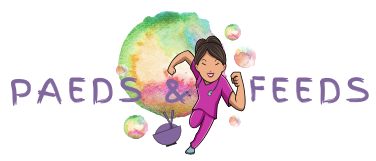Well hello again everyone!
Can you believe that the year is drawing to a close?! I know we say it every year, but geez this year went quickly! The tree is UP, the orders (to Santa) are IN and the kids… well the kids are still not really behaving themselves despite threats that Santa might not come (face palm)!
My 4 year old is toeing a fine line at present… she is on probation from Santa and his helper elves who are keeping a close eye on her (and you might have noticed on FB, made a stealthy night time mission to our house to leave her a note warning her about the “naughty list”). I’m not altogether sure that for all my effort, there has been a dramatic change in behaviour, but some is better than none I guess. Sighhh…
So today I thought I’d let you guys know about iron deficiency in children. Quite a few bloggees recently requested the topic and I thought that it was a good “meaty” topic to bite into (ha ha!! Sorry… I seriously cannot help myself).
Iron is a really important mineral that is responsible for VITAL body functions.
This explanation could get really complicated BUT basically, iron is needed for the body to make:
- Haemoglobin – a component of red blood cells that pick up oxygen from the lungs and carries it round the body, dropping it off where it is needed in the tissues.
- Myoglobin – a protein in the muscles that stores and releases oxygen for use
So in a nutshell, the body needs iron to function. Full stop.
Kids of all ages are at risk of iron deficiency for various reasons, but mainly because they need increased amounts of iron in their diet to be able to grow. If a child’s diet does not contain enough iron, they will eventually develop anaemia – which means that there is a lower than normal number of red blood cells (or haemoglobin IN the red blood cells), that results in the body cells being deprived of oxygen. As ALL of the body’s tissues need oxygen to work, the effects of iron deficiency anaemia are wide ranging and include:
- Failure to thrive (or poor weight gain)
- Decreased exercise tolerance (and breathlessness)
- Feeling tired a lot (lethargy)
- Poor attention and concentration at school and behavioural problems
- Increased sweating
- Frequent infections
- Weird food cravings, like eating dirt or non-food items (this is called pica)
- Poor appetite
RISK FACTORS
Certain kids are at higher risk of developing iron deficiency and these include:
- Babies who are born prematurely (earlier than 37 weeks gestation) or have a low birth weight (less than 2.5 kg)
- Exclusive breastfeeding past 6 months (without the introduction of solid foods)
- Consumption of large volumes of cow’s milk in kids under 2 years old
- Those who have a vegetarian or vegan diet
- Low or no meat intake
- Fussy eaters or those with poor diet in their 2nd year of life
- Those with gastrointestinal diseases (eg Coeliac’s disease)
Having said all of this, it is REALLY important to note that **iron is toxic in large doses!**
So even if you suspect that your fussy eating/skinny/meat-hating flower-child is iron deficient, DO NOT self diagnose and just give them an iron supplement because an iron overdose can be FATAL! To diagnose iron deficiency, a doctor needs to take a history, examine your child, order a blood test (or a few) and review the results. When or IF the decision is made to put your child on an iron supplement, then the blood test will be repeated in 3-4 months to CHECK that the right dose has been given AND to make sure we haven’t “overshot” the mark. The doctor will continue to monitor your child (ie even past taking them OFF the supplement) to make sure that their iron levels remain normal.
So I mentioned that there are different reasons for iron deficiency in kids of different ages. These are some common causes of iron deficiency in various age groups and what we can do about it:
Babies less than 6 months old
These babies get their iron whilst they are still in-utero – from their mother’s blood. This means that a woman’s diet during pregnancy is REALLY important. Babies who are born prematurely (before 37 weeks gestation) or those who are really small (low birth weight) at birth are at higher risk of iron deficiency and usually needs supplements under the supervision of their GP or paediatrician.
- What to do about it?
- Eat lots of iron rich food (eg beef, lamb) during pregnancy
- Let your doctor order a blood test to check for iron deficiency (and other things); take your supplement only as directed
- Breastmilk does contain iron, just not that much. So either breastfeed or choose an iron-containing formula (pretty much all of them do) suitable for your baby’s age. Don’t give cow’s milk before the age of 12 months as this discourages a good appetite for solids
- Don’t delay introduction of solid food!! You can start introducing solids (smooth/pureed) at 4 months, but any time between 4-6 months is okay.
Babies 6 months – 12 months
The store of iron that babies have from their mother during pregnancy starts to run out in the 2nd half of a baby’s first year of life. If the baby hasn’t had a good introduction of solid foods that contain iron at the right time, then they can run into trouble. I usually recommend introduction of solids at 4 months of age (I know, I know… I need to do a post on introduction of solid food too… I’ll get there eventually!!) – usually initially baby cereal (which is fortified with iron) or pureed veggies/fruit, later mixing in various pureed meats once the baby has got the hang of the early stuff. If you introduce solids too late, then this can put your baby at risk of iron deficiency.
12 months – 5 years
In this age group, common causes of iron deficiency are
- Too much milk: eg prolonged breastfeeding or excessive consumption of low-iron milks (eg cow/goat/soy milk) where the milk replaces solid foods in the diet (ie the child drinks too much and is too full to eat solid food)
- Poor intake of solids/fussy eaters
- Chronic diarrhoea or parasitic infection
Often, it is a combination of both of these.
- What to do about it?
- Include lean, red meat (beef, lamb) in the diet 3-4 times a week. Other dietary sources of iron include: beans, lentils, chickpeas, chicken, fish, eggs and there is a small amount in nuts. If your family is vegan or vegetarian then it might be advisable to see a paediatric dietician to make sure there is enough iron in your child’s food.
- Vitamin C helps the body to absorb more iron! Foods like oranges, berries, tomatoes, broccoli and capsicum are all good sources and including these is beneficial
- Offer solid food BEFORE drinks at mealtimes
- If you have a fussy eater, see a paediatric dietician!
Teenagers
Girls especially in this age group are at risk of iron deficiency because they start to lose iron through menstruation (periods) and they are more likely than other children to restrict eating due to dieting.
- What to do about it?
- Serve meat, fish or chicken with dinner (this kind of dietary iron is absorbed and used by the body HEAPS more easily than an iron supplement)
- Choose iron-fortified cereal and bread
- Ensure your child understands the importance of iron and how to get it in their diet so they can make the right choices themselves.
If you suspect or are worried about iron deficiency or anaemia in your child, go and see your GP. Asides from dietary reasons, there are other medical reasons that need to be ruled out in the diagnosis.
TREATMENT for iron deficiency can include:
- Increasing dietary intake of iron with iron-rich foods (the best way)
- Iron supplementation – talk to you pharmacist about what preparations are available and what is most suitable for your child given their age and the dose they are prescribed (eg Incremin, Ferro-liquid etc). Remember giving iron WITH vitamin C, increases absorption of the iron! A dose will be calculated by your doctor (or pharmacist) depending on the degree of iron deficiency and your child’s age and weight.
- Treatment for infection (eg parasitic infection that might cause chronic diarrhoea)
Take home messages:
- Diagnosing and treating iron deficiency is hugely important in supporting children’s normal development
- Children are at risk of iron deficiency because they have increased need for dietary iron due to the fact that they are GROWING; this risk is increased in children with vegetarian diets
- If you are worried about iron deficiency in your child, then go and see your GP to get properly assessed; do not self-diagnose or self-treat
- Breastfeed or give babies under 12 months of age infant formula – NOT cow’s/goat’s/soy milk
- Give your child a supplement at the prescribed dose as directed by your doctor. Keep iron supplements away from children – overdose can be FATAL
- Introduce solids to infants at 4-6 months of age
- If you need help with your child’s diet and intake – see an accredited paediatric dietician!
Now guys, I think given how busy we ALL are in the 2 weeks that remain leading up to Christmas, this will be my last Kid’s Health post for the year… I definitely have to “practice what I preach” and be a little kinder to myself in terms of my commitments to work, fitness and family… and my very human need to get a little sleep.
SO, have a WONDERFUL, MERRY AND HAPPY CHRISTMAS and a BRILLIANT NEW YEAR, whatever you are doing and wherever you are, with whomever you are with.
Stay safe and I will be seeing you in 2018 with even MORE exciting posts about Kid’s Health and food & recipe awesomeness! I’ll post you some pics of our Christmas feast too!
Keep your suggestions for topics coming and I’ll be back in this space really soon!!!!!!
Merry Christmas! See you in January!!!
xxDr Megs

